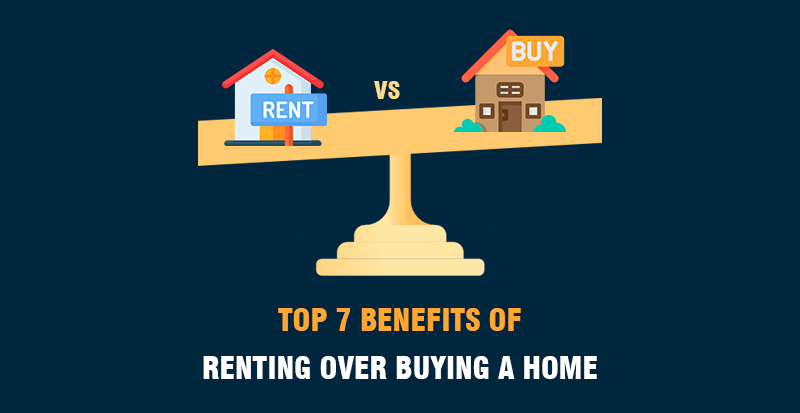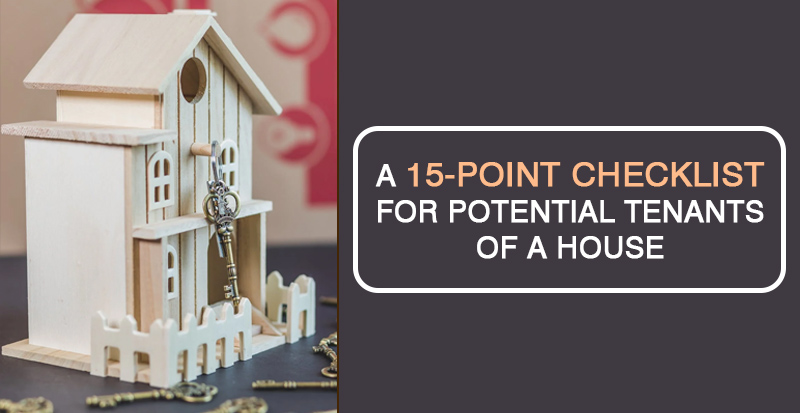Attention, soon-to-be-movers! Prepare to be blown away by essential things to do when moving to a new home for first time. Say goodbye to stress and hello to a fresh start!
Don’t Wait, Get Free Quotes!
Congratulations on discovering such a stunning house! Moving to a new home for the first time can be an exciting yet daunting experience. Whether you are relocating across town or to an entirely new city, there are numerous essential factors to consider, ensuring a smooth transition. From packing and organising your belongings to setting up utilities and familiarising yourself with the neighbourhood, there are many things to do. Accomplishing these all tasks with perfection is not a fun job. There can be several other tasks that you might miss due to hectic schedules. So, how will you manage everything? No worries! I can understand what’s going on your mind. I have already gone through this process.
To help you with your move, I have compiled a list of some useful tips and techniques that can make your move easier and hassle-free. In this blog post, you will find 21 essential tips and tasks to tackle when moving to a new home for the first time. By following these essential guidelines, you can prepare yourself to embark on this transformative journey and make your new house truly feel like home. Review all the essential tasks that need to be completed to ensure your home is ready for occupancy.
21 Things to Do When Moving to a New Home
Unlock the secrets of a seamless move to your new home! Discover essential tips and techniques that will make your first-time move a breeze.
1. Plan ahead
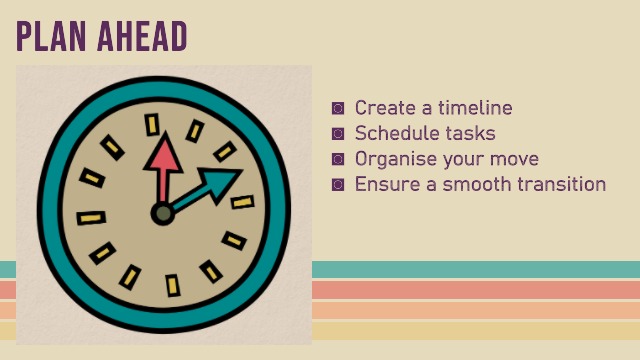
Planning ahead is crucial when moving to a new home. By creating a timeline and scheduling tasks, you can streamline the moving process and avoid last-minute stress. Determine important dates, such as lease end or move-in day, and break down tasks like packing, notifying utility companies, and changing your address into manageable steps. This organisation will help you stay on track and ensure a smooth transition to your new home.
2. Notify important parties
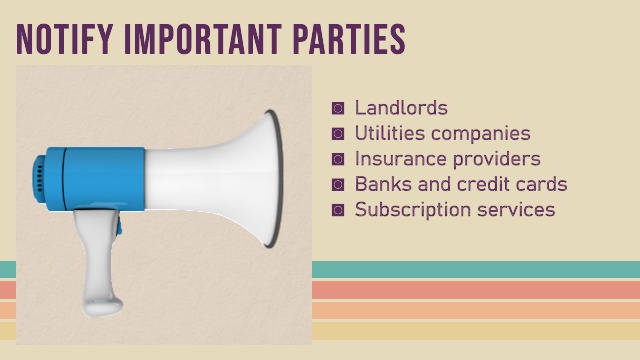
When moving to a new home, it's essential to notify essential parties in advance. Inform your landlord about your move-out date and return keys. Contact utility companies, such as electricity, water, and internet providers, to schedule service transfers or cancellations. Additionally, inform other relevant parties like insurance providers, banks, and subscription services to update your address and account information accordingly.
3. Change your address

Changing your address is an important step when moving to a new home. Visit your local post office or go online to update your address officially. Additionally, notify your bank, credit card companies, and other financial institutions to ensure they have your new address on file. Don't forget to update your address with subscription services, government agencies, healthcare providers, and any other necessary institutions to ensure a seamless transition.
4. Pack strategically
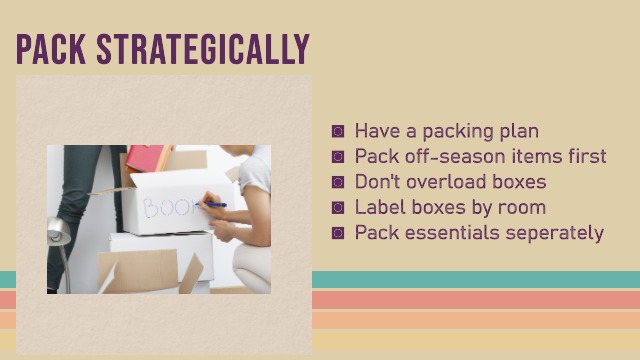
When packing for your move, it's essential to do so strategically. Start by labelling boxes according to the rooms they belong to, such as "kitchen," "bedroom," or "bathroom." This will make unpacking much easier. Additionally, pack essential items separately in a clearly labelled box. These could include toiletries, a change of clothes, essential documents, and basic kitchen utensils. Having these essentials readily accessible will save you from rummaging through multiple boxes during the first few days in your new home.
5. Declutter house

Before you start packing for your move, take the opportunity to declutter. Go through your belongings and identify items that you no longer need, use, or have sentimental value. Consider donating, selling, or discarding these items. Decluttering house not only reduces the number of things you have to pack and transport, but also helps create a fresh start in your new home with a streamlined and organised living space.
6. Measure your new space
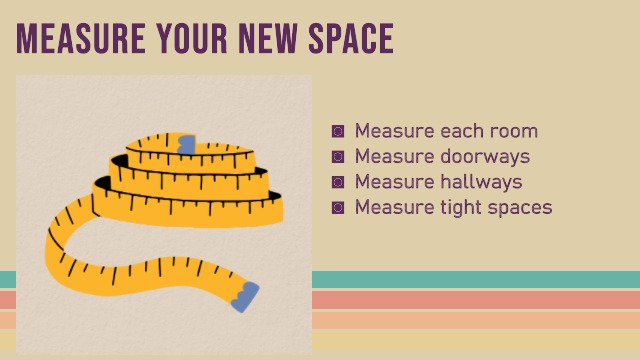
Taking measurements of your new space is crucial for planning your furniture arrangement. Measure each room, including doorways, hallways, and any tight spaces, to ensure your existing furniture will fit comfortably. This step will help you determine which pieces you can bring from your current home, and if any adjustments or new furniture purchases are necessary. It allows you to visualise the layout and optimise the use of your new space.
7. Arrange for movers or rent a truck
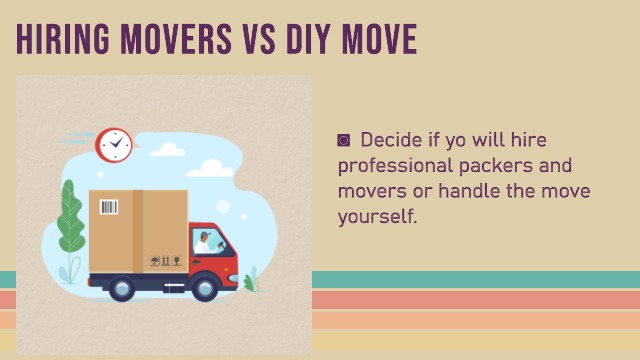
When planning your move, you'll need to decide whether to hire professional packers and movers or handle the move yourself. Hiring professional movers can save you time and effort, especially for larger moves or if you have delicate or valuable items. They can handle packing, loading, transportation, and unloading. On the other hand, if you prefer more control and have a smaller move, renting a truck and managing the move yourself can be a cost-effective option. Consider your budget, time constraints, and personal preferences when making this decision.
8. Pack an essentials box
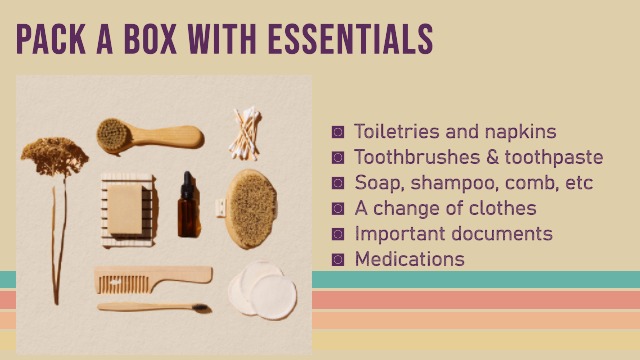
When moving to a new home, it's essential to pack an essentials box. This box should contain items you'll need immediately upon arrival at your new place. Pack toiletries, such as soap, toothbrushes, and toilet paper, as well as a change of clothes for each family member. Include essential documents like identification, medical records, and financial paperwork. Additionally, consider including basic kitchen items like plates, cups, and utensils. Having this essentials box readily accessible will help you settle in comfortably during the first day in your new home without having to rummage through multiple boxes.
9. Transfer utilities
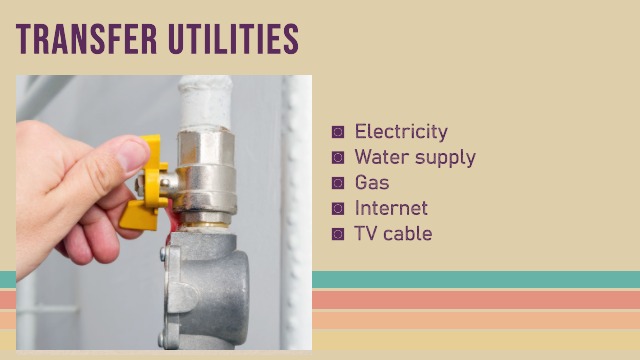
Transferring utilities to your new address is a crucial step when moving. Contact your utility providers, such as electricity, water, gas, and internet companies, well in advance of your move. Provide them with your new address and schedule the transfer of services to ensure you have essential utilities up and running on the day of your move. This way, you can avoid any interruptions in services and ensure a smooth transition to your new home.
10. Forward mail

To avoid missing essential mail during your move, set up mail forwarding with the post office. Visit your local post office or go online to submit a mail forwarding request. This service will redirect your mail from your old address to your new one for a specified period of time. By doing so, you can ensure that significant documents, bills, and other mail items are forwarded to your new home.
11. Clean your new home

Before moving into your new home, it's crucial to ensure it is clean and fresh. Hiring professional cleaners can take the burden off your shoulders and ensure a thorough cleaning of every nook and corner. With their expertise and specialised equipment, they will leave your home spotless, ready for you to settle in comfortably. Opting for professional cleaners saves you time and effort. It allows you to focus on other important aspects of your move. You can also do pest control in your new home before moving in.
12. Set up internet and cable
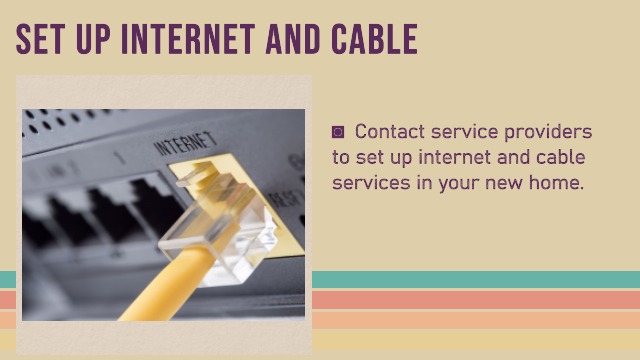
Moving into a new home is exciting! After you settle in, it's critical to set up the internet and cable, so you can watch your favourite shows and play games. Contact service providers to set up internet and cable services in your new home. They will help you get the internet and cable services all connected in your new home. Then, you can enjoy watching your favourite shows and videos. Remember to say "thank you" to the service providers for helping you!
13. Unpack essentials first
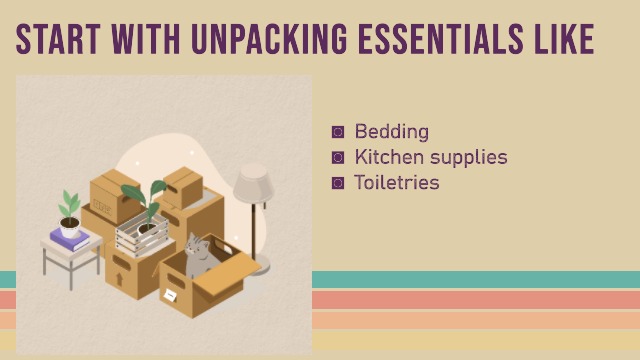
When you move into your new home, it's essential to prioritise your unpacking process. Begin by unpacking the absolute essentials first, ensuring a smooth transition. Focus on items like bedding, which will allow you to have a comfortable night's sleep amidst the chaos. Next, tackle the kitchen supplies, enabling you to prepare meals and enjoy home-cooked food. Lastly, unpack toiletries to maintain personal hygiene and convenience. By unpacking these essential items first, you'll establish a sense of normalcy and make your new space feel like home from the very beginning.
14. Familiarise yourself with the neighbourhood

As you settle into your new life in your new city, familiarise yourself with the neighbourhood by exploring the local area. Take some time to locate essential amenities such as grocery stores, ensuring you have convenient access to fresh food and household necessities. Discover nearby parks and recreational areas that offer opportunities for relaxation and outdoor activities. Additionally, identify healthcare facilities in the vicinity, including hospitals or clinics, so you know where to go in case of medical emergencies. By getting to know your neighbourhood, you'll feel more connected to your surroundings and establish a sense of belonging in your new community.
15. Update your driving licence and vehicle registration

It is crucial to update your driving licence and vehicle (car/bike) registration to comply with the local regulations in your new city. Start by visiting the appropriate government office or transport authority to initiate the process. Ensure you have the necessary documentation, such as proof of address, identification, and existing licence details. By updating your driving licence and car registration, you'll not only adhere to legal requirements, but also ensure a hassle-free driving experience in the city. Stay informed about the specific procedures and deadlines to complete these updates promptly and enjoy a smooth transition in your new location.
16. Find local healthcare professionals

When you move to a new city, it's important to find and establish relationships with local service providers. Take the time to research and locate doctors, dentists, and veterinarians in your new area. Look for recommendations from neighbours, colleagues, or online resources to find reputable professionals. Consider factors such as proximity, specialisation, and availability when making your choices. Building a network of reliable healthcare providers ensures that you and your family receive the necessary medical care when needed. By proactively finding local service providers, you'll have peace of mind knowing that you have access to quality healthcare professionals in your new city.
17. Meet your neighbours
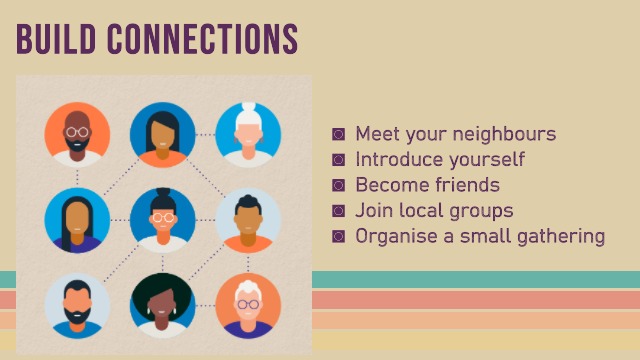
As you settle into your new life in the new city, it's essential to take the initiative and meet your neighbours. Introduce yourself, extend a warm greeting, and begin building connections within the community. Getting to know your neighbours not only fosters a sense of belonging, but also creates a support network. They can provide valuable information about the neighbourhood, recommend local services, and even become friends. Attend community events, join local groups, or organise a small gathering to facilitate these introductions. By actively engaging with your neighbours, you'll establish a friendly and supportive environment that enhances your overall experience in your new home. Know here about moving insurance types and charges.
18. Check your insurance policies

After relocating to your new city, review and update your insurance policies, especially your home insurance. You need to update your new address. Contact your insurance provider and inform them about the change in location. Update your policy with the correct address to ensure proper coverage for your new home. Additionally, assess other insurance policies you may have, such as auto or health insurance, and update them accordingly. By taking this proactive step, you'll have peace of mind knowing that your insurance coverage accurately reflects your new circumstances, providing financial protection and security in your new residence.
19. Install necessary safety features
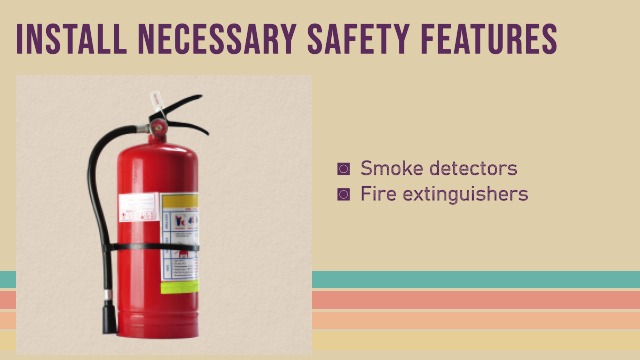
When you move into your new home, prioritise your safety by installing the necessary safety features. Make sure your home is equipped with functioning smoke detectors in key areas such as bedrooms and living rooms. Additionally, have fire extinguishers strategically placed throughout the house. These safety measures provide early detection and the means to tackle potential fire hazards. Check the batteries in smoke detectors regularly and familiarise yourself with fire extinguisher usage. By taking these precautions, you can protect yourself and your loved ones, ensuring a secure living environment in your new home.
20. Set up a maintenance schedule
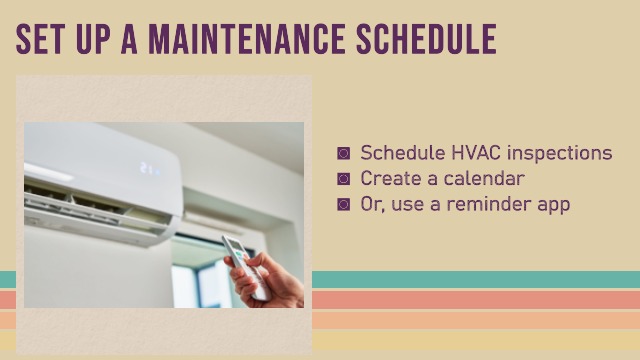
To keep your new home running smoothly, it's important to set up a maintenance schedule. Plan regular tasks such as changing air filters, scheduling HVAC inspections, and performing routine upkeep. These proactive measures ensure that your home's systems and appliances continue to function efficiently. Create a calendar or use reminder apps to stay organised and on top of maintenance tasks. Regular maintenance helps prevent major issues, extends the lifespan of your equipment, and promotes a healthy living environment. By implementing a maintenance schedule, you'll save time, money, and stress, and enjoy a well-maintained home.
21. Take time to settle in

Moving to a new house in a new city can be both exciting and overwhelming. It's essential to take the time to settle in and allow yourself to adjust to your new surroundings. Embrace the process of transforming your new house into a home that reflects your personality and style. Unpack at your own pace, arrange furniture, hang up artwork, and add personal touches. Explore the neighbourhood, discover local attractions, and build connections with the community. Remember to be patient with yourself and savour each moment. By embracing the journey of making your new house a home, you'll create lasting memories and a sense of belonging in your new residence.
Final Thoughts
In conclusion, moving to a new home for the first time can be an exciting yet challenging experience. By following the 21 essential tips and tasks outlined in this guide, you can navigate the process more smoothly and ensure a successful transition.
From planning ahead and notifying important parties to unpacking essentials and familiarising yourself with the neighbourhood, each step plays a crucial role in making your new house truly feel like home. Remember to be patient, take breaks, and ask for help when needed.
Moving may be stressful at times, but by embracing the journey and taking care of yourself, you'll create lasting memories and establish a sense of belonging in your new residence. Congratulations on your new home, and best of luck with your move! Consider hiring professional packers and movers for safe and hassle-free transportation of your belongings.
A copywriter, blogger, content strategist by profession, and an information junkie by heart. I have a penchant for reading, researching, writing, and anything related to creating persuasive content. For me, writing is something that ignites my creativity and helps in keeping me on cloud nine. I have been working in the content writing domain since 2006. Be it blogging or copywriting, I create better content that fuels conversations and skyrockets search traffic.



